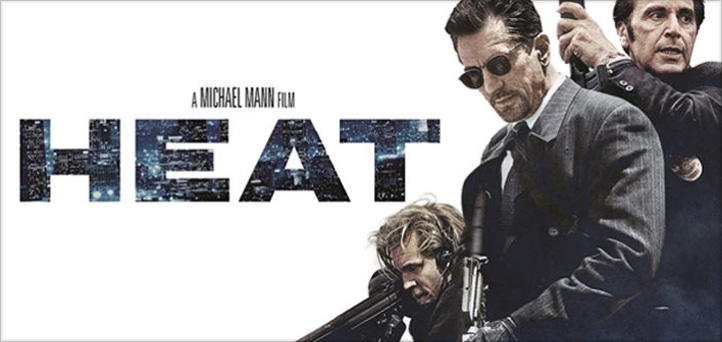Heat (1995)

“Heat,” directed by Michael Mann and released on December 15, 1995, stands as one of the most iconic crime films in American cinema. With powerhouse performances from Robert De Niro, Al Pacino, and Val Kilmer, “Heat” delves into the complex worlds of professional criminals and law enforcement, weaving a narrative that explores themes of obsession, loyalty, and the moral ambiguities of both sides of the law.
At the heart of “Heat” is the intense cat-and-mouse game between two formidable characters: Neil McCauley, played by Robert De Niro, and Lieutenant Vincent Hanna, portrayed by Al Pacino. McCauley is a meticulous and highly skilled thief who leads a crew in executing high-stakes heists. His calm demeanor and strategic thinking make him a master in his field, but his commitment to his craft often puts him at odds with personal relationships. On the other hand, Hanna is a dedicated LAPD detective, consumed by his job and the pursuit of justice. His relentless drive to catch McCauley mirrors the criminal’s own obsessive nature, creating a captivating duality that runs throughout the film.
The film’s plot kicks off with a daring armored car heist orchestrated by McCauley and his team, which sets the stage for the ensuing conflict between the criminal world and law enforcement. Mann’s direction effectively immerses viewers in the high-stakes atmosphere of Los Angeles, using the city itself as a character in the story. The cinematography captures the sprawling urban landscape, with its neon lights and gritty back alleys, underscoring the tension that permeates the narrative.
One of the standout features of “Heat” is its remarkable ensemble cast. In addition to De Niro and Pacino, Val Kilmer delivers a compelling performance as Chris Shiherlis, a key member of McCauley’s crew struggling with his own personal demons. The chemistry between the characters adds depth to the narrative, as their individual storylines intertwine with the central conflict. The film also includes notable performances from actors such as Jon Voight, Tom Sizemore, and Ashley Judd, each contributing to the film’s intricate web of relationships.
Mann’s meticulous attention to detail is evident in the film’s action sequences. The climactic bank heist scene is a masterclass in tension and choreography, featuring realistic gunfire and strategic planning. The sound design amplifies the chaos of the shootout, making it a visceral experience for the audience. This level of realism is a hallmark of Mann’s style, elevating “Heat” beyond typical crime dramas.

In addition to its thrilling action, “Heat” explores profound themes that resonate with audiences. The film delves into the personal sacrifices made by its characters, particularly focusing on the dichotomy between their professional lives and personal relationships. McCauley’s solitary existence and Hanna’s strained marriage highlight the toll that obsession can take on one’s life. Both men are ultimately driven by a relentless pursuit—McCauley for his next heist, and Hanna for the capture of a master criminal—raising questions about the costs of their choices.

The dialogue in “Heat” is another standout element, featuring memorable exchanges that encapsulate the characters’ philosophies and motivations. One of the film’s most iconic moments occurs during the coffee shop scene, where McCauley and Hanna finally meet face-to-face. Their conversation reveals the respect they hold for each other’s skills, yet it also underscores the philosophical divide between their worlds. This moment encapsulates the film’s exploration of morality, showcasing the fine line between hero and villain.

The film’s score, composed by Elliot Goldenthal, further enhances its emotional depth. The haunting melodies underscore key moments, amplifying the tension and drama. The music serves as a backdrop to the characters’ inner turmoil, complementing their struggles and desires.

In conclusion, “Heat” is a cinematic triumph that transcends the boundaries of traditional crime films. With its complex characters, intricate narrative, and breathtaking action sequences, it remains a significant work in the genre. Michael Mann’s direction, combined with stellar performances from an exceptional cast, creates a gripping exploration of the human condition within the realms of crime and law enforcement. As viewers navigate the moral ambiguities of the story, they are left to ponder the costs of obsession, the nature of justice, and the pursuit of one’s passion in a world fraught with danger. “Heat” endures as a classic, a film that resonates with audiences long after the credits roll.
Suggested videos for you:
Suggested videos for you:
@lovrstify99 Floyd Lawton shows Deadshot Suicide Squad #movie #movieclips #actionmovie
Suggested videos for you:
@licktowing11 Bambina VS Raptor feroce 65 – Fuga dalla Terra #movie #movieclips #moviehighlights #highlight










